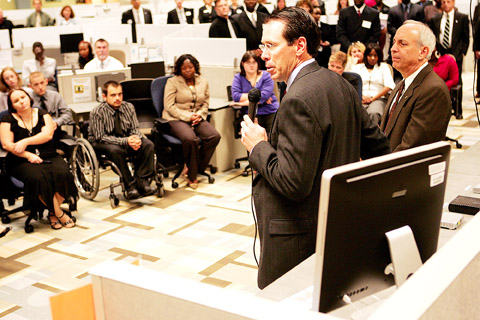The tightening of the global credit markets is crimping the world’s largest telecommunications company.
AT&T Inc chairman and CEO Randall Stephenson said on Tuesday that his company was unable to sell any commercial paper last week for terms longer than overnight.
Commercial paper, which helps lubricate the flow of business operations, is a short-term IOU available to corporations that banks usually know are good for the money.

PHOTO: BLOOMBERG
It’s not that short-term borrowing is unreasonably expensive, Stephenson said.
A shortage of buyers for the debt means such borrowing is not as readily available as it had been even three weeks ago, he said.
“It’s loosened up a bit, but it’s day-to-day right now. I mean literally it’s day-to-day in terms of what our access to the capital markets looks like,” Stephenson said.
AT&T spokesman Larry Solomon said later that as of Tuesday, the company had ready access to the commercial paper market at reasonable rates and various terms.
But as a result of the recent volatility, managers at the Dallas-based phone company are more cautious.
“Your ability to plan for investment is obviously affected. You kind of don’t know what your cost of capital six months from now is going to be,” he said. “We’ll just be very guarded, cautious in terms of where we invest, very guarded and cautious in terms of hiring and capital spending. We’ll see where this situation goes.”
Separately, Microsoft chief executive Steve Ballmer said on Tuesday the global financial crisis would sap consumer and business spending, affecting all companies, including his own.
“Financial issues are going to affect both business spending and consumer spending, and particularly ... spending by the financial services industry,” Ballmer told reporters on the sidelines of a news conference in Oslo.
“We have a lot of business with the corporate sector as well as with the consumer sector and whatever happens economically will certainly effect itself on Microsoft,” he said.
“I think one has to anticipate that no company is immune to these issues,” he said, but declined to be more specific.
Wall Street analysts, on average, expect the Redmond, Washington-based company to generate an 8 percent rise in revenue to just under US$15 billion in its first-quarter ending last month.
“There are parts of our every business which are probably ‘safe’ in the sense that it’s not like our business would go to zero,” he said in an interview.
“On the other hand, when businesses have less money — they can borrow less money, they can spend less money — that can’t be good. When consumers feel the economic pinch, house prices come down. That can’t be good,” Ballmer said.

The CIA has a message for Chinese government officials worried about their place in Chinese President Xi Jinping’s (習近平) government: Come work with us. The agency released two Mandarin-language videos on social media on Thursday inviting disgruntled officials to contact the CIA. The recruitment videos posted on YouTube and X racked up more than 5 million views combined in their first day. The outreach comes as CIA Director John Ratcliffe has vowed to boost the agency’s use of intelligence from human sources and its focus on China, which has recently targeted US officials with its own espionage operations. The videos are “aimed at

STEADFAST FRIEND: The bills encourage increased Taiwan-US engagement and address China’s distortion of UN Resolution 2758 to isolate Taiwan internationally The Presidential Office yesterday thanked the US House of Representatives for unanimously passing two Taiwan-related bills highlighting its solid support for Taiwan’s democracy and global participation, and for deepening bilateral relations. One of the bills, the Taiwan Assurance Implementation Act, requires the US Department of State to periodically review its guidelines for engagement with Taiwan, and report to the US Congress on the guidelines and plans to lift self-imposed limitations on US-Taiwan engagement. The other bill is the Taiwan International Solidarity Act, which clarifies that UN Resolution 2758 does not address the issue of the representation of Taiwan or its people in

US Indo-Pacific Commander Admiral Samuel Paparo on Friday expressed concern over the rate at which China is diversifying its military exercises, the Financial Times (FT) reported on Saturday. “The rates of change on the depth and breadth of their exercises is the one non-linear effect that I’ve seen in the last year that wakes me up at night or keeps me up at night,” Paparo was quoted by FT as saying while attending the annual Sedona Forum at the McCain Institute in Arizona. Paparo also expressed concern over the speed with which China was expanding its military. While the US

SHIFT: Taiwan’s better-than-expected first-quarter GDP and signs of weakness in the US have driven global capital back to emerging markets, the central bank head said The central bank yesterday blamed market speculation for the steep rise in the local currency, and urged exporters and financial institutions to stay calm and stop panic sell-offs to avoid hurting their own profitability. The nation’s top monetary policymaker said that it would step in, if necessary, to maintain order and stability in the foreign exchange market. The remarks came as the NT dollar yesterday closed up NT$0.919 to NT$30.145 against the US dollar in Taipei trading, after rising as high as NT$29.59 in intraday trading. The local currency has surged 5.85 percent against the greenback over the past two sessions, central